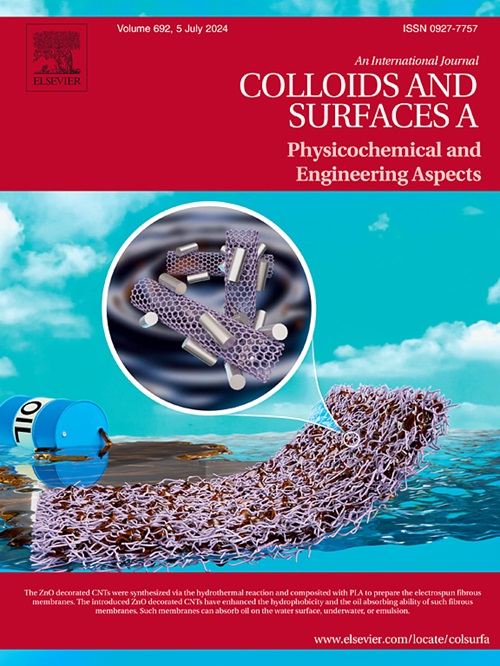环保型生物基油基钻井液添加剂:高效合成、有序自组装、超强耐超高温、抗沉降性能优异
IF 5.4
2区 化学
Q2 CHEMISTRY, PHYSICAL
Colloids and Surfaces A: Physicochemical and Engineering Aspects
Pub Date : 2025-04-22
DOI:10.1016/j.colsurfa.2025.137014
引用次数: 0
摘要
巧妙地设计弱相互作用力,是实现高效、绿色石油勘探的有效途径。为解决钻井液高温不稳定、体系中重晶石易沉积、合成添加剂污染等问题,通过引入含氮的磺胺、胺、腈等官能团,简单有效地合成了新型生物基松香和单宁衍生物。所得化合物在有机溶剂和工业白油中表现出明显的自组装能力。在氢键和π-π堆积的驱动下,超分子材料的微观结构呈现出微米级、晶体状的片层结构和棒状的三维网络结构。值得注意的是,乳液凝胶显示它们是填充凝胶,具有增强的弹性和更高的粘度。此外,在油基钻井液中加入松香基衍生物可以有效地保持粘度和乳状液的稳定性。180℃老化72 小时后,旋转粘度的最大变化限制在9 mPa·s。松香和单宁复合添加剂通过改变氢键和π-π堆积等非共价相互作用,特别是共价相互作用配位键,极大地提高了重晶石的耐超高温和抗沉降性能。经200℃超高温热轧后的乳液破乳电压可达1800 V以上,沉降系数仅为0.502。在油基钻井液中加入环保的含氮生物基添加剂,成功解决了重晶石在极高温度下在油基钻井液中的稳定性和沉降问题。这使得在极热的深井中进行石油和天然气勘探能够正常、稳定地进行。本文章由计算机程序翻译,如有差异,请以英文原文为准。
Environmentally friendly bio-based additives in oil-based drilling fluids: Efficient synthesis, well-ordered self-assembly, exceptional ultra-high-temperature resistance, and excellent anti-settling properties
Skillfully designing weak interaction forces offers an effective approach to realize efficient and green oil exploration. In order to solve the problems such as the high-temperature instability of the drilling fluid, the easy sedimentation of barite in the system, and the pollution caused by the synthesized additives, novel bio-based rosin and tannin derivatives were simply and effectively synthesized by introducing nitrogen containing functional groups such as sulfonamide, amine and nitrile. The obtained compounds exhibited notable self-assembly capabilities in organic solvents and industrial white oil. The microstructures of supramolecular materials displayed micrometer-sized, crystal-like lamellar structures and rod-like three-dimensional network structures driven by hydrogen bonding and π-π stacking in an ordered and spontaneous manner. Notably, emulsion gels showed they were filled gels with enhanced elasticity and higher viscosity. Furthermore, the rosin-based derivatives added in oil-based drilling fluid could efficiently maintain the viscosity and emulsion stability. The maximum change in rotational viscosity was limited to 9 mPa·s after aging for 72 hours at 180 ℃. By modifying a number of non-covalent interactions, such as hydrogen bonding and π-π stacking, and especially covalent interactions coordination bonding, the composite additives made from rosin and tannin greatly enhanced the heavy spar's ultra-high temperature resistance and anti-settling properties. The emulsion breaking voltage reached more than 1800 V and settling factors was only 0.502 after hot rolling at 200 ℃ ultra-high temperature. The stability and sedimentation of heavy spar in oil-based drilling fluids at extremely high temperatures were successfully addressed by the environmentally friendly nitrogen-containing bio-based additives in oil-based drilling fluids. This allowed for the regular and stable operation of oil and gas exploration in extremely hot and deep wells.
求助全文
通过发布文献求助,成功后即可免费获取论文全文。
去求助
来源期刊
CiteScore
8.70
自引率
9.60%
发文量
2421
审稿时长
56 days
期刊介绍:
Colloids and Surfaces A: Physicochemical and Engineering Aspects is an international journal devoted to the science underlying applications of colloids and interfacial phenomena.
The journal aims at publishing high quality research papers featuring new materials or new insights into the role of colloid and interface science in (for example) food, energy, minerals processing, pharmaceuticals or the environment.

 求助内容:
求助内容: 应助结果提醒方式:
应助结果提醒方式:


